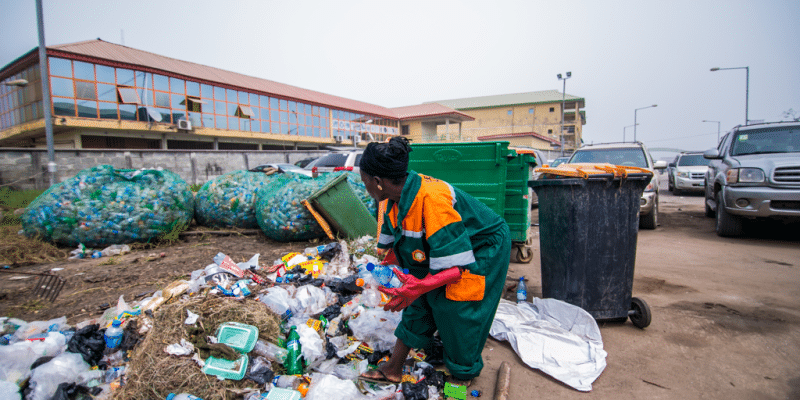In 2024, Africa will also be expected to improve its solid waste management. This will involve putting in place more concrete solutions for the collection, sorting and recycling of this waste, which could reach 244 million tonnes per year by 2025 if current trends continue. In 2016 alone, the continent generated 174 million tonnes of solid waste, according to UN-Habitat.
Over the next 12 months, African decision-makers will need to focus their attention on the implementation of practical, innovative solutions to the problem of solid waste. In most African countries, the initial focus on solid waste collection will have to be repainted. While most of the budget for solid waste management in developing countries currently goes on collection, according to the World Bank’s What a Waste 2.0 study, less than half the waste produced in Africa is formally collected. And in some countries, this practice is often non-existent, especially in rural areas.
The result is that this waste ends up in the streets and waterways. When it decomposes, its particles are released and pollute the environment, particularly the soil on which the food we eat will be grown. In 2016 alone, the continent generated 174 million tonnes of solid waste, according to UN-Habitat.
Read Also – AFRICA: The continent tops a global ranking on pollution levels
By 2024, the first challenge is to succeed in reducing the amount of solid waste thrown onto the streets, with the aim of achieving an average rate of 69% of debris collected by 2025, according to the United Nations programme working towards a better urban future. A passive attitude on the part of governments and players in the waste sector in Africa would be dangerous for the continent, which would then run the risk of reaching the 244 million tonnes per year mark by 2025.
Could smart bins be the solution?
Where traditional solid waste collection solutions have borne little fruit, more modern solutions could be a godsend for several countries. These solutions include smart bins, which are still not widely used in Africa.
Rwanda, which has been officially trialling this solution since 2 November 2021, can now monitor waste levels in real time. The smart bins initially installed in the capital, Kigali, are fitted with sensors that alert waste collectors. The system also works with closed-circuit cameras and a geographic information system (GIS) to ensure the security of waste collection facilities.
Although solid waste production is currently lower in Africa than in developed countries, sub-Saharan Africa could become the world’s dominant region. This production is fuelled by demographic growth (3.5% per year), rapid urbanisation, the growth of the middle class, changing consumption habits and production methods, as well as trade and trafficking in waste on a global scale.
The second picture to be painted in 2024 concerns the disposal of the waste collected. At present, more than 90% of the waste produced in Africa is disposed of in uncontrolled landfill sites, often accompanied by open burning, according to UN-Habitat in a study entitled “Waste problems in Africa”. Yet this waste could be transformed into wealth. This would also help to reduce pollution.
Is it possible to exceed the 4% mark for solid waste recycled by 2024?
The solution to turning solid waste into wealth is recycling. While a number of countries are already recycling their waste, including Egypt, Morocco, South Africa, Ghana, Rwanda, Kenya, Ivory Coast and the Democratic Republic of Congo (DRC), there are still major disparities between countries. It is estimated that 70% to 80% of solid waste generated is recyclable, but only 4% of solid waste is currently recycled in Africa, according to the United Nations.
If we are to pass the 4% mark this year, we will need to increase the number of recycling facilities in towns and villages, develop a skilled solid waste recycling workforce, train the local workforce to support the projects and maintain the facilities. However, implementing this policy requires substantial funding, which governments do not always have.
“In low-income countries, waste management absorbs up to 20% of municipal budgets. Local governments often lack funds, covering less than 50% of the investment costs for waste management systems. The rest comes mainly from subsidies from national governments, and the allocation of funds from national governments to local governments is often disrupted by instability”, deplores UN-Habitat, whose mission is to promote the sustainable development of human settlements in social and environmental terms, as well as access to decent housing for all.
The private sector also needs to be given greater responsibility to speed up the management of this solid waste, which also poses risks to human health. According to experts, plastic alone can potentially affect fertility, hormonal, metabolic and neurological activity. What’s more, open-air burning of plastics contributes to air pollution.
Read Also – NIGERIA: Bola Tinubu suspends the 10% green tax on single-use plastics
At its meeting on 1 March 2022 in the Kenyan capital Nairobi, the United Nations Environment Assembly (UNEA) adopted a resolution establishing an Intergovernmental Negotiating Committee (INC) to draw up an international agreement to combat plastic pollution. The treaty, which will cover the entire life cycle of plastics, including their production, use and disposal, is due to come into force this year.
Inès Magoum






